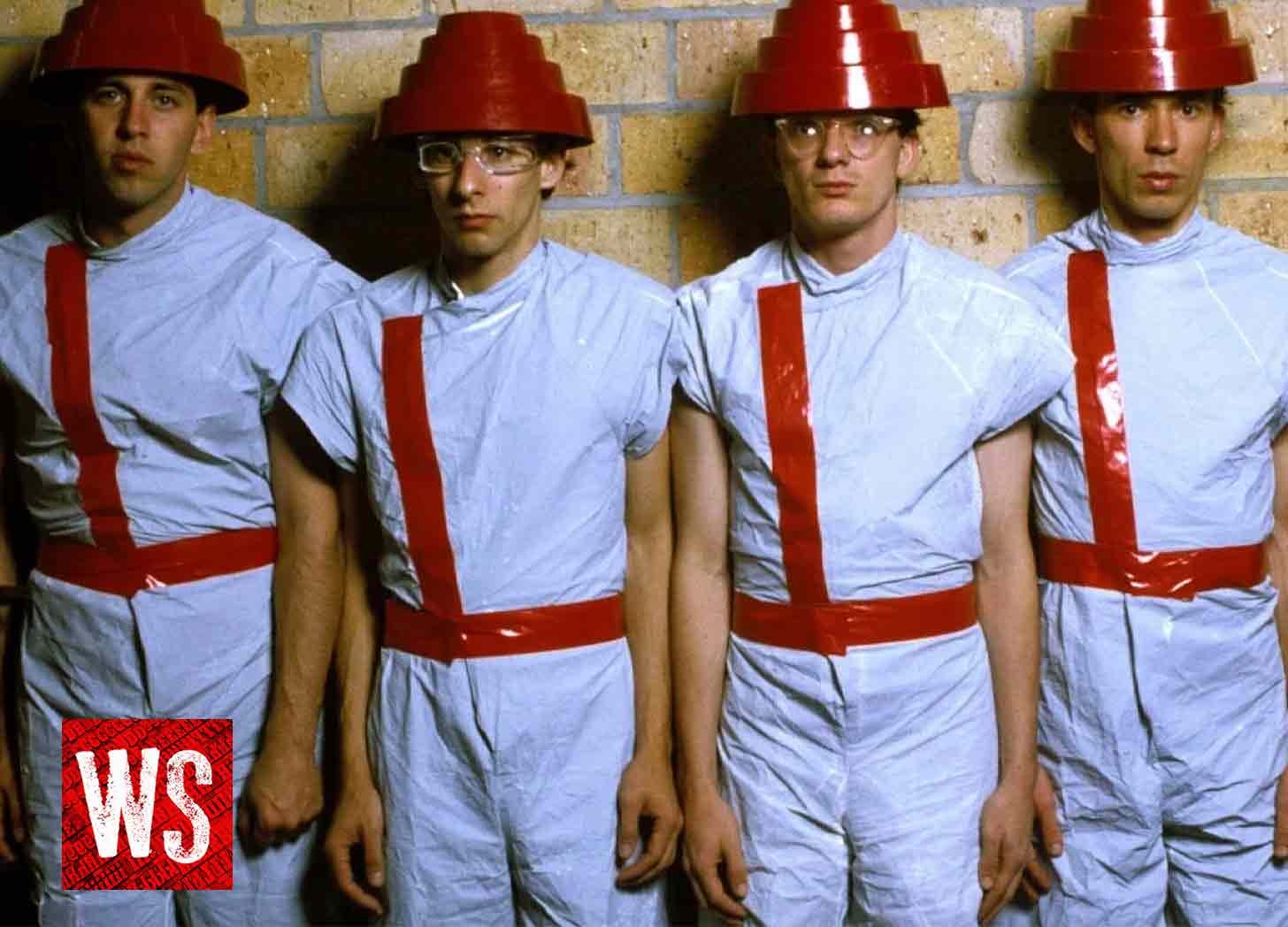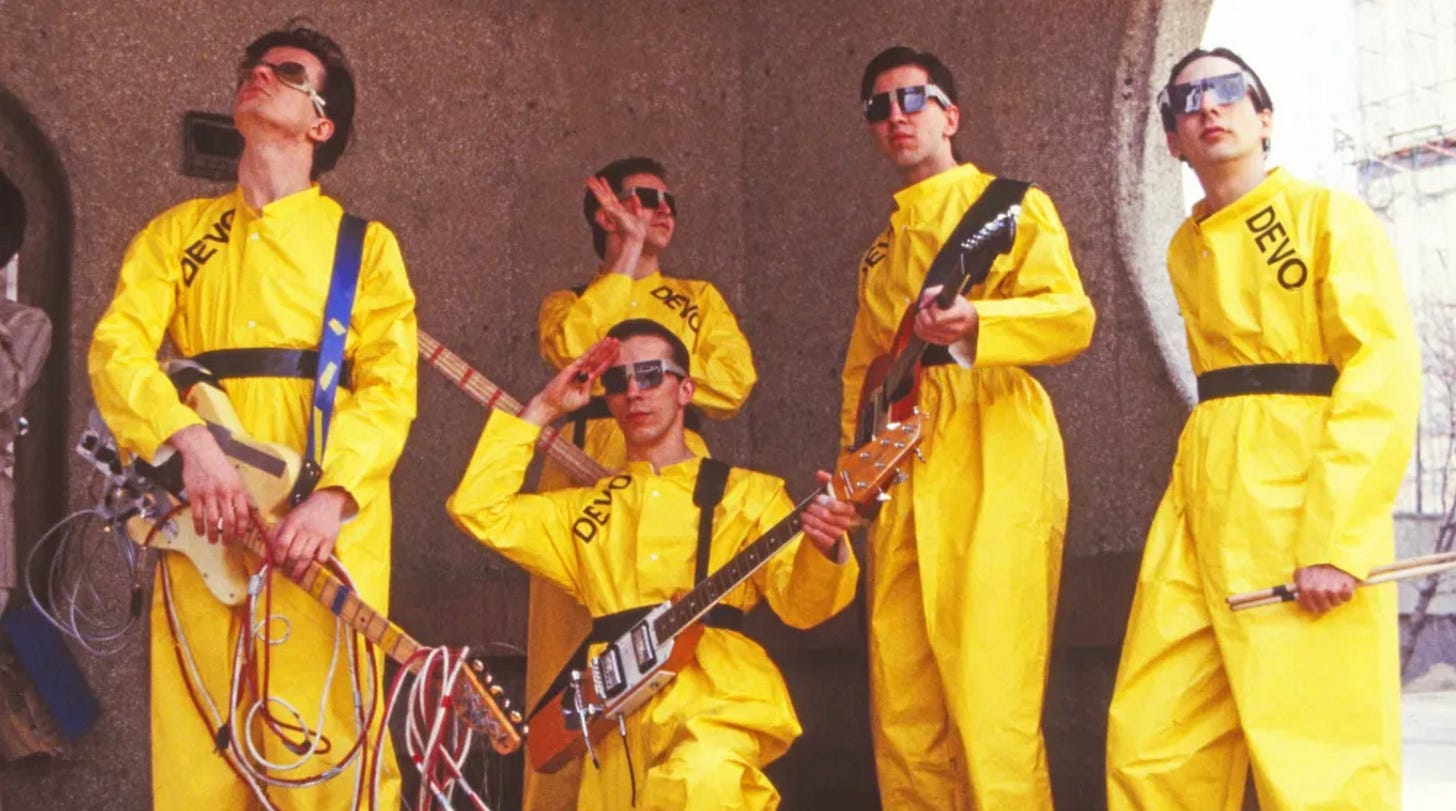Devo
Directed by: Chris Smith
Starring: Mark Mothersbaugh
I didn’t want to see Devo, but Chris Bumbray loves a good music documentary and I wanted to catch a movie with my pal. So, I got some popcorn and we sat down to watch a documentary about the band with the weird hats that are best known for the song “Whip it.” Up until that point, that’s about all I knew about Devo. By the end of the doc, I had a whole origin story and a new appreciation for the quirky band who played such a huge role in the MTV music video culture of the 1980s.
Founded by Mark and Bob Mothersbaugh, Bob Lewis, Gerald and Bob Casale, with a rotation of members throughout the years. Devo was an eclectic, odd, and performative group of artists who collided on the campus of Kent State University, during the time of the Vietnam War protests that eventually led to the infamous massacre in 1970. As a bunch of idealistic artists, the group clung to ideas of de-evolution, which supposes that early man evolved from cannibalistic apes that ate the brains of other apes to become human. This led to their name, Devo, which ultimately stands for De-evolution. The more you know.
The documentary unfolds in a chaotic style, narrated primarily by Mothersbaugh, with interviews collected from other members throughout the years, and gives an expansive portrait of the group’s formation, ideals, and development into a globe-spanning name. What’s most interesting is watching how this group of idealists who wanted to change the world became the very thing they were pushing back against. And, it’s not lost on them by any means.
On one hand, you find yourself cheering for Devo to be this buck-the-trend band that spits in the face of capitalism and “the man”, etc., but at the same time you’re cheering for them to be a success, to make money, and to become a worldwide sensation. Ultimately, it reveals the irony that achieving their goal means achieving what they didn’t want to put into the world to begin with, which is another band that churns out one album after another, eventually getting lost in the charts, rather than pursuing the goal of making change.
Throughout the doc we are shown old interviews from a variety of talk shows and MTV visits where the band, seemingly in character (it’s difficult to know what’s serious and what’s satire) are dismissive of traditional music, citing how it has nothing to say, while their own music is either too cryptic or too on-the-nose. It’s an interesting compare and contrast and reveals Devo as a perplexing, innovative, ironic, and fascinating group that struggled with the desire to see the world become a better place through their music, while also profiting and making a living from it. In the end, they were much like the loud protesters that you see marching in the streets, holding up signs, wearing costumes, and making a lot of noise, before disappearing from the streets, leaving a trail of their presence behind them.
I don’t mean that as a knock against Devo at all, but rather further evidence of their complexity as a group, as demonstrated in the doc. There’s certainly more to unpack from the group, and their post-Devo career as composers is covered too briefly in the end. Mothersbaugh has composed scores for multiple feature films, including The Life Aquatic, The Royal Tenenbaums, Thor: Ragnarok, Cocaine Bear, Rugrats, and many, many more, creating an entire second career that arguably has eclipsed his work with Devo, becoming an industry go-to in Hollywood.
Devo reminded me of the Nirvana doc, Montage of Heck, which is by far my favorite band-themed documentary of all time, as it sheds light on things you likely were unaware of while highlighting the thing that matters the most for something like this: the music. If nothing else, Devo will have you diving back into their discography with a new appreciation for their work and possibly discovering some of their older work anew, ironically paying a big music conglomerate to listen to it (unless you’re a rebel and torrent it, which makes it even more ironic).





